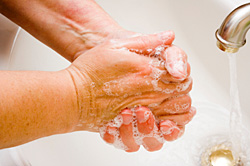|

National Black Church Initiative is a subsidiary
of the DC Black Church Initiative
|
Food Safety Guide for People with HIV
 Nothing
spoils a delicious feast faster than a case of food poisoning. Illnesses
like salmonella, campylobacter, listeria and cryptosporidium can
lurk in seemingly safe-looking food and water and cause a nasty
bout of diarrhea, nausea and stomach cramps, vomiting, fever, headache
and muscle pain. Nothing
spoils a delicious feast faster than a case of food poisoning. Illnesses
like salmonella, campylobacter, listeria and cryptosporidium can
lurk in seemingly safe-looking food and water and cause a nasty
bout of diarrhea, nausea and stomach cramps, vomiting, fever, headache
and muscle pain.
Each year, millions of people
get sick from food poisoning and thousands die from it. And while
food-borne illnesses are a threat to everyone, people with HIV or
AIDS are at particular risk because of their weakened immune systems.
Symptoms are usually worse and food-borne illnesses can lead to
serious conditions like bloodstream infections and meningitis in
people with HIV.
If you're living with AIDS or
HIV, the Center for Disease Control and Prevention offer these tips
to keep bad food from spoiling your health:
-
Wash it Off
Experts say that simple hand washing can prevent many cases
of food poisoning Wash hands at least 20 seconds with hot, soapy
water before and after preparing food, especially raw meat and
poultry. Also, carefully wash raw fruits and vegetables before
you eat them, even if they have an outer peel like a banana.
-
Cook it Thoroughly
Meat, poultry and fish can make you seriously ill if they are
raw or undercooked. If it's pink in the middle, then it's not
done. If you use a meat thermometer, cook meat at 165°F;
poultry to 170°F. Cook fish until it's flaky, not rubbery.
Avoid raw or lightly steamed fish or shellfish (oysters, clams,
mussels, sushi), undercooked eggs and foods with raw eggs like
hollandaise sauce, cookie dough or Caesar salad dressing. Cook
eggs until the yoke and white are solid, and only eat or drink
pasteurized milk or dairy foods.
-
Separate Raw and Cooked Foods
Cross contamination is another cause of food poisoning Keep
raw meat, poultry and seafood separate from cooked foods and
ready-to-eat items like fruit, vegetables and bread. Tightly
seal raw meat in plastic wrap or storage bags to keep juices
from leaking on other foods. Marinate raw items in the refrigerator
and never reuse the marinade on cooked foods. Use separate utensils,
cutting boards and containers for raw and ready-to-eat foods.
-
Filter it
Check with your health department about the safety of your tap
water for people with HIV. If you're unsure, drink bottled water,
get a water filter or boil tap water to kill any germs. Also,
carbonated beverages in cans and bottles like sodas are typically
safe to drink. And never ever drink water straight from lakes,
rivers, streams or springs.
|